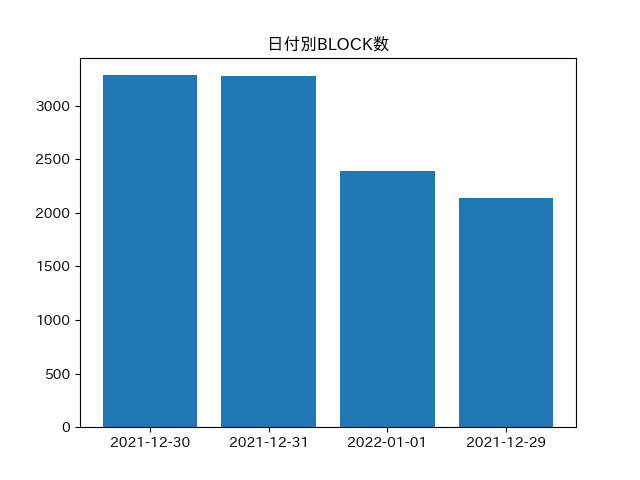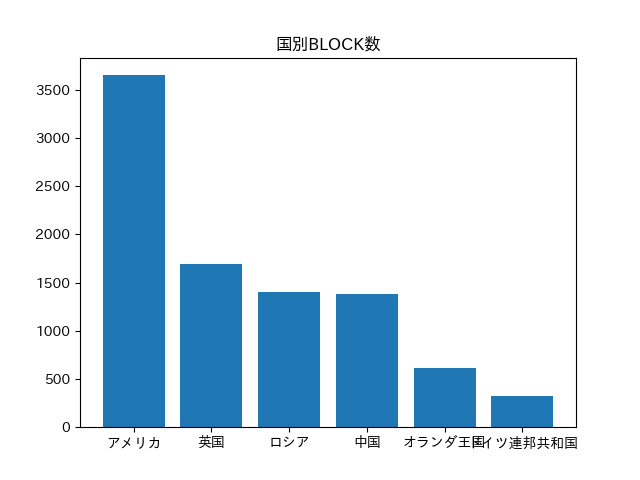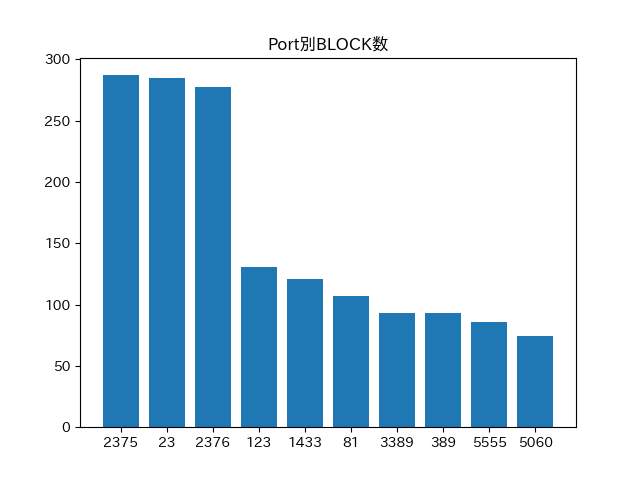今回はPythonプログラミングネタです。
筆者は本WEBブログサーバのufwログをPythonを使って集計していますが、
この集計結果をグラフにしてみましょう。
matplotlibにより生成されたグラフ
まずは出力されたグラフからご紹介。
今回はmatplotlibの棒グラフ形式で試してみました。
以下は日付別の棒グラフです。
左側が件数です。
12月の30、31は3500件近くありました。
12月の29日は移行日ですので、件数は少ないですね。
1月1日の本日もまだ日中ですので2500件いかないくらい。
1日平均3500弱はブロックしている状況です。
これが公開サーバの恐ろしさですね。

データ部分
日付をカウントするグループを作成し、標準ライブラリのcollectionsで追加、
most_commonで最頻値を特定しています。
ip_dategroup = collections.Counter(ip_date)
plt_date_data=[
ip_dategroup.most_common(1)[0][0],
ip_dategroup.most_common(2)[1][0],
ip_dategroup.most_common(3)[2][0],
ip_dategroup.most_common(4)[3][0],
]
plt_date_ydata=[
ip_dategroup.most_common(1)[0][1],
ip_dategroup.most_common(2)[1][1],
ip_dategroup.most_common(3)[2][1],
ip_dategroup.most_common(4)[3][1],
]matplotlib箇所
fig = plt.figure()
plt.title('日付別BLOCK数')
plt.bar(plt_date_data,plt_date_ydata)
path3="/share3/backup/pythonlabo/ufwdate.png"
plt.savefig(path3)以下は国別のグラフです。
アメリカがトップ。
他はかなり低めで英国、中国、ロシアが並ぶ感じです。

データ部分
こちらも標準ライブラリのcollectionsで追加、most_commonで最頻値を特定しています。
ip_cntrgroup = collections.Counter(ip_country)
plt_cnt_data=[
ip_cntrgroup.most_common(1)[0][0],
ip_cntrgroup.most_common(2)[1][0],
ip_cntrgroup.most_common(3)[2][0],
ip_cntrgroup.most_common(4)[3][0],
ip_cntrgroup.most_common(5)[4][0],
ip_cntrgroup.most_common(6)[5][0],
]
plt_cnt_ydata=[
ip_cntrgroup.most_common(1)[0][1],
ip_cntrgroup.most_common(2)[1][1],
ip_cntrgroup.most_common(3)[2][1],
ip_cntrgroup.most_common(4)[3][1],
ip_cntrgroup.most_common(5)[4][1],
ip_cntrgroup.most_common(6)[5][1],
]matplotlib箇所
fig = plt.figure()
plt.title('国別BLOCK数')
plt.bar(plt_cnt_data,plt_cnt_ydata)
path2="/share3/backup/pythonlabo/ufwcnt.png"
plt.savefig(path2)以下は攻撃対象となったポートのグラフ。
圧倒的にDockerがターゲットにされていますね。
デフォルトのパスワードのままのテンプレ使い回しとかは絶対に狙われそうですね。

データ部分
こちらも標準ライブラリのcollectionsで追加、most_commonで最頻値を特定しています。
ip_dprtgroup = collections.Counter(ip_dport)
plt_dprt_data=[
ip_dprtgroup.most_common(1)[0][0],
ip_dprtgroup.most_common(2)[1][0],
ip_dprtgroup.most_common(3)[2][0],
ip_dprtgroup.most_common(4)[3][0],
ip_dprtgroup.most_common(5)[4][0],
ip_dprtgroup.most_common(6)[5][0],
ip_dprtgroup.most_common(7)[6][0],
ip_dprtgroup.most_common(8)[7][0],
ip_dprtgroup.most_common(9)[8][0],
ip_dprtgroup.most_common(10)[9][0],
]
plt_dprt_ydata=[
ip_dprtgroup.most_common(1)[0][1],
ip_dprtgroup.most_common(2)[1][1],
ip_dprtgroup.most_common(3)[2][1],
ip_dprtgroup.most_common(4)[3][1],
ip_dprtgroup.most_common(5)[4][1],
ip_dprtgroup.most_common(6)[5][1],
ip_dprtgroup.most_common(7)[6][1],
ip_dprtgroup.most_common(8)[7][1],
ip_dprtgroup.most_common(9)[8][1],
ip_dprtgroup.most_common(10)[9][1],
]matplotlib箇所
fig = plt.figure()
plt.title('Port別BLOCK数')
plt.bar(plt_dprt_data,plt_dprt_ydata)
path4="/share3/backup/pythonlabo/ufwprt.png"
plt.savefig(path4)はい、まずは生成されたグラフと該当コードからご紹介しました。
コード全体
コード全体は以下になります。
集計部分は前回のコードを修正追加したものです。
またログはiptablesのログを使うことにしたため、
余計なログのフィルタリングを追加しています。
for matplot以降がmatplotによるグラフ生成の箇所になります。
#!/usr/bin/python3
import re
import sys
import ipaddress
import geoip2.database
import csv
import collections
import matplotlib.pyplot as plt
import japanize_matplotlib
#filename='/var/log/ufw.log'
filename='/var/log/iptables.log'
ip_address = []
ip_country = []
ip_date = []
ip_dport = []
#gipcity = geoip2.database.Reader("/var/lib/GeoIP/GeoLite2-City.mmdb")
gip = geoip2.database.Reader("/var/lib/GeoIP/GeoLite2-Country.mmdb")
#
def trans_geoip(ip_addr):
if '192.168.1.' in ip_addr:
return ('Private')
try:
response = gip.country(ip_addr)
return (response.country.names['ja'])
except:
#print('')
return
#
def trans_word(input_text):
replacements = {
'Jan':'01',
'Feb':'02',
'Mar':'03',
'Apl':'04',
'May':'05',
'Jun':'06',
'Jul':'07',
'Aug':'08',
'Sep':'09',
'Oct':'10',
'Nov':'11',
'Dec':'12',
}
# print('({})'.format('|'.join(map(re.escape,replacements.keys()))))
return re.sub('({})'.format('|'.join(map(re.escape,replacements.keys()))),lambda m: replacements[m.group()],input_text)
#
if __name__ == '__main__':
with open(filename) as f:
reader = csv.reader(f,delimiter=" ",doublequote=False,lineterminator="\r\n")
for row in reader:
if row[6]=='ALLOW]':
#len(row[6])
#print(row[6],row[10])
continue
if row[6]=='AUDIT]':
#len(row[6])
#print(row[6],row[10])
continue
if row[0]=='Dec':
if (len(row))>19:
# print(row[19].strip("DPT="))
ip_dport.append(row[19].strip("DPT="))
#if row[10].find('DST=192.168.1.') == True:
ip_list = ("2021"+"-"+trans_word(row[0])+"-"+row[1].zfill(2),row[2].zfill(2),row[10].strip("SRC="))
ip_address.append(row[10].strip("SRC="))
ip_date.append("2021"+"-"+trans_word(row[0])+"-"+row[1].zfill(2))
#print(row[10])
ip_country.append(trans_geoip(row[10].strip("SRC=")))
if row[0]!='Dec':
# f print(row[0][0:10])
if (len(row))>17:
#print(row[17].strip("DPT="))
ip_dport.append(row[17].strip("DPT="))
ip_list = ((row[0][0:10]),row[8].strip("SRC="))
ip_address.append(row[8].strip("SRC="))
ip_date.append((row[0][0:10]))
ip_country.append(trans_geoip(row[8].strip("SRC=")))
ip_addrgroup = collections.Counter(ip_address)
ip_dategroup = collections.Counter(ip_date)
ip_cntrgroup = collections.Counter(ip_country)
ip_dprtgroup = collections.Counter(ip_dport)
print(ip_cntrgroup.most_common(10))
print(ip_dategroup.most_common(10))
print(ip_addrgroup.most_common(10))
print(ip_dprtgroup.most_common(10))
print(len(ip_addrgroup))
print(trans_geoip(ip_addrgroup.most_common(1)[0][0]),ip_addrgroup.most_common(1)[0][0],ip_addrgroup.most_common(1)[0][1])
######################
# for matplot
plt_dprt_data=[
ip_dprtgroup.most_common(1)[0][0],
ip_dprtgroup.most_common(2)[1][0],
ip_dprtgroup.most_common(3)[2][0],
ip_dprtgroup.most_common(4)[3][0],
ip_dprtgroup.most_common(5)[4][0],
ip_dprtgroup.most_common(6)[5][0],
ip_dprtgroup.most_common(7)[6][0],
ip_dprtgroup.most_common(8)[7][0],
ip_dprtgroup.most_common(9)[8][0],
ip_dprtgroup.most_common(10)[9][0],
]
plt_dprt_ydata=[
ip_dprtgroup.most_common(1)[0][1],
ip_dprtgroup.most_common(2)[1][1],
ip_dprtgroup.most_common(3)[2][1],
ip_dprtgroup.most_common(4)[3][1],
ip_dprtgroup.most_common(5)[4][1],
ip_dprtgroup.most_common(6)[5][1],
ip_dprtgroup.most_common(7)[6][1],
ip_dprtgroup.most_common(8)[7][1],
ip_dprtgroup.most_common(9)[8][1],
ip_dprtgroup.most_common(10)[9][1],
]
plt_date_data=[
ip_dategroup.most_common(1)[0][0],
ip_dategroup.most_common(2)[1][0],
ip_dategroup.most_common(3)[2][0],
ip_dategroup.most_common(4)[3][0],
]
plt_date_ydata=[
ip_dategroup.most_common(1)[0][1],
ip_dategroup.most_common(2)[1][1],
ip_dategroup.most_common(3)[2][1],
ip_dategroup.most_common(4)[3][1],
]
plt_cnt_data=[
ip_cntrgroup.most_common(1)[0][0],
ip_cntrgroup.most_common(2)[1][0],
ip_cntrgroup.most_common(3)[2][0],
ip_cntrgroup.most_common(4)[3][0],
ip_cntrgroup.most_common(5)[4][0],
ip_cntrgroup.most_common(6)[5][0],
]
plt_cnt_ydata=[
ip_cntrgroup.most_common(1)[0][1],
ip_cntrgroup.most_common(2)[1][1],
ip_cntrgroup.most_common(3)[2][1],
ip_cntrgroup.most_common(4)[3][1],
ip_cntrgroup.most_common(5)[4][1],
ip_cntrgroup.most_common(6)[5][1],
]
plt_ip_data=[
trans_geoip(ip_addrgroup.most_common(1)[0][0]),
trans_geoip(ip_addrgroup.most_common(2)[1][0]),
trans_geoip(ip_addrgroup.most_common(3)[2][0]),
trans_geoip(ip_addrgroup.most_common(4)[3][0]),
trans_geoip(ip_addrgroup.most_common(5)[4][0]),
trans_geoip(ip_addrgroup.most_common(6)[5][0]),
]
plt_ip_ydata=[
ip_addrgroup.most_common(1)[0][1],
ip_addrgroup.most_common(2)[1][1],
ip_addrgroup.most_common(3)[2][1],
ip_addrgroup.most_common(4)[3][1],
ip_addrgroup.most_common(5)[4][1],
ip_addrgroup.most_common(6)[5][1],
]
fig = plt.figure()
plt.title('日付別BLOCK数')
plt.bar(plt_date_data,plt_date_ydata)
path3="/share3/backup/pythonlabo/ufwdate.png"
plt.savefig(path3)
fig = plt.figure()
plt.title('国別IP_BLOCK数')
plt.bar(plt_ip_data,plt_ip_ydata)
path1="/share3/backup/pythonlabo/ufwip.png"
plt.savefig(path1)
fig = plt.figure()
plt.title('国別BLOCK数')
plt.bar(plt_cnt_data,plt_cnt_ydata)
path2="/share3/backup/pythonlabo/ufwcnt.png"
plt.savefig(path2)
fig = plt.figure()
plt.title('Port別BLOCK数')
plt.bar(plt_dprt_data,plt_dprt_ydata)
path4="/share3/backup/pythonlabo/ufwprt.png"
plt.savefig(path4)matplotへY軸、X軸のデータを投入する箇所については関数化すれば、
もっと効率良いコードになるかと思いますが、今回は単純なコードの繰り返しで作成しています。
まとめ
今回はufwのログをpythonで集計して、matplotlibで棒グラフの作成について紹介しました。
何かの参考になれば幸いです。





